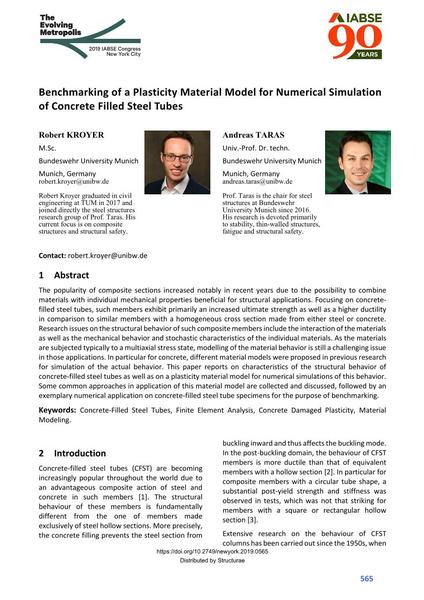Benchmarking of a Plasticity Material Model for Numerical Simulation of Concrete Filled Steel Tubes

|
|
|||||||||||
Bibliographic Details
| Author(s): |
Robert Kroyer
(Bundeswehr University Munich)
Andreas Taras (Bundeswehr University Munich) |
||||
|---|---|---|---|---|---|
| Medium: | conference paper | ||||
| Language(s): | English | ||||
| Conference: | IABSE Congress: The Evolving Metropolis, New York, NY, USA, 4-6 September 2019 | ||||
| Published in: | The Evolving Metropolis | ||||
|
|||||
| Page(s): | 565-569 | ||||
| Total no. of pages: | 5 | ||||
| DOI: | 10.2749/newyork.2019.0565 | ||||
| Abstract: |
The popularity of composite sections increased notably in recent years due to the possibility to combine materials with individual mechanical properties beneficial for structural applications. Focusing on concrete- filled steel tubes, such members exhibit primarily an increased ultimate strength as well as a higher ductility in comparison to similar members with a homogeneous cross section made from either steel or concrete. Research issues on the structural behavior of such composite members include the interaction of the materials as well as the mechanical behavior and stochastic characteristics of the individual materials. As the materials are subjected typically to a multiaxial stress state, modelling of the material behavior is still a challenging issue in those applications. In particular for concrete, different material models were proposed in previous research for simulation of the actual behavior. This paper reports on characteristics of the structural behavior of concrete-filled steel tubes as well as on a plasticity material model for numerical simulations of this behavior. Some common approaches in application of this material model are collected and discussed, followed by an exemplary numerical application on concrete-filled steel tube specimens for the purpose of benchmarking. |
||||
| Keywords: |
finite element analysis FEA concrete-filled steel tubes concrete damaged plasticity material modeling
|
||||
